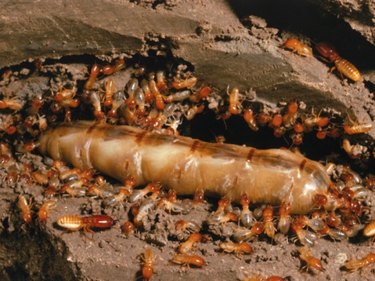
Wood-eating insects can be a danger to anyone's home and/or yard. The most well-known flying insect that consumes wood is the drywood termite. Many are not aware that there are also other types of flying insects and bugs, such as Asian long-horned beetles, horntail wasps and carpenter bees, that can also cause a significant amount of wood damage. Each flying wood-eating bug has its own distinctive characteristics and types of wood that they prefer.
Drywood Termite
Video of the Day
Drywood termites are mostly found in the the southern and western parts of the U.S. They do travel in furniture and, in some instances, may be located in other areas of America. These termites survive by eating dead trees, wooden floors, wooden building structures and furniture. Drywood termites range in color from light yellow to black and can have clear to light gray wings.
Video of the Day
Asian Long-Horned Beetle
This beetle was transported to America from Asia in packaging material made from wood. These insects create infestations that are so numerous they can kill healthy adult trees. They are large insects that measure between 1 to 1.5 inches. They are black and white and have a metallic shine.
Wood Wasp (Horntail)
Horntail wasps are blue, black or a reddish-brown color. Most have yellow or beige stripes and gray wings. Horntails can be found in fire-damaged trees and infest logs and wood products. They live for up to three years and can be found in finished lumber from logs that were not kiln-dried. Some wood wasps can kill young trees.
Carpenter Bees
Carpenter bees appear in April and May. They look like bumblebees, except for one difference -- their abdomen is not hairy like the bumblebee. Carpenter bees are attracted to bare wood. They usually do not cause much damage unless there are several bees that have drilled a lot of tunnels over time. They may also leave a light brownish stain on wood from eliminating wastes.